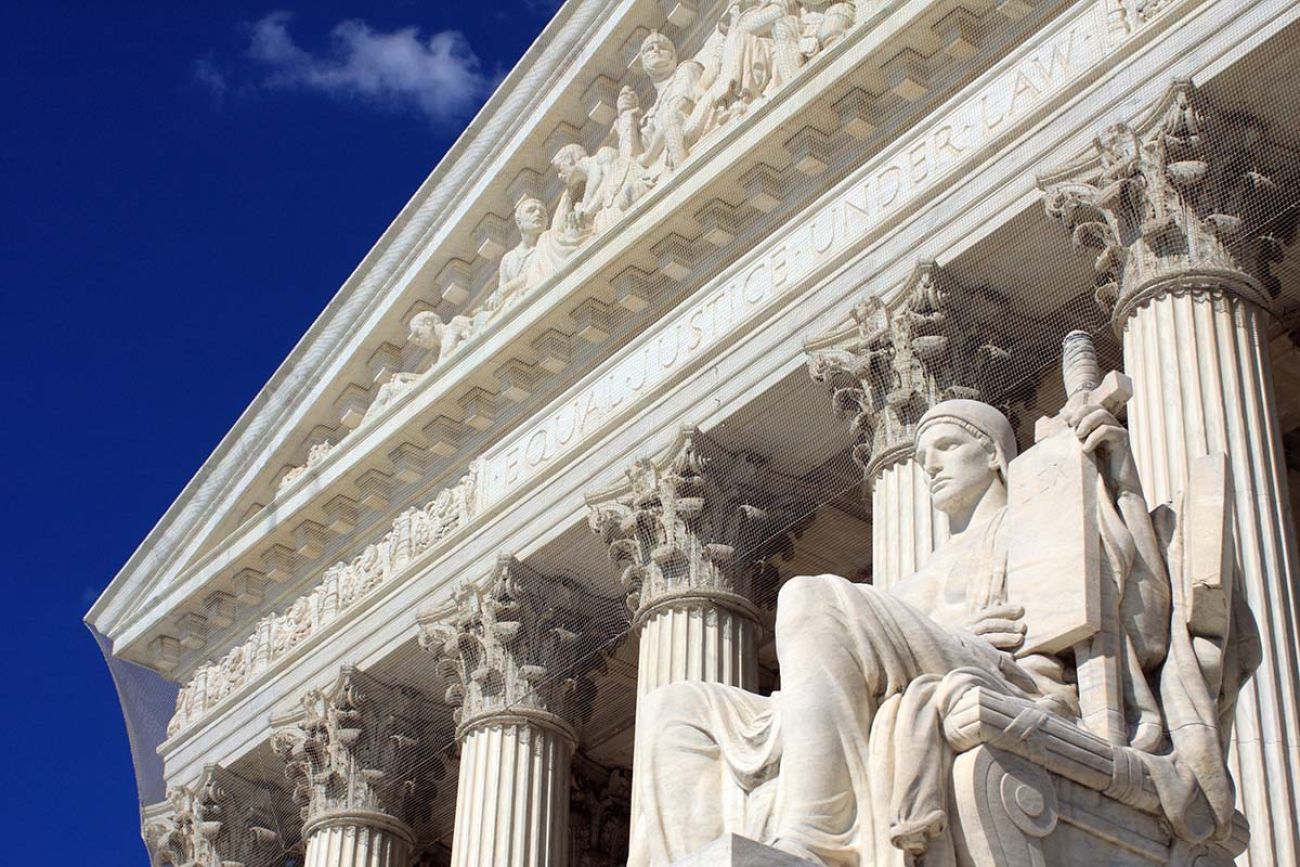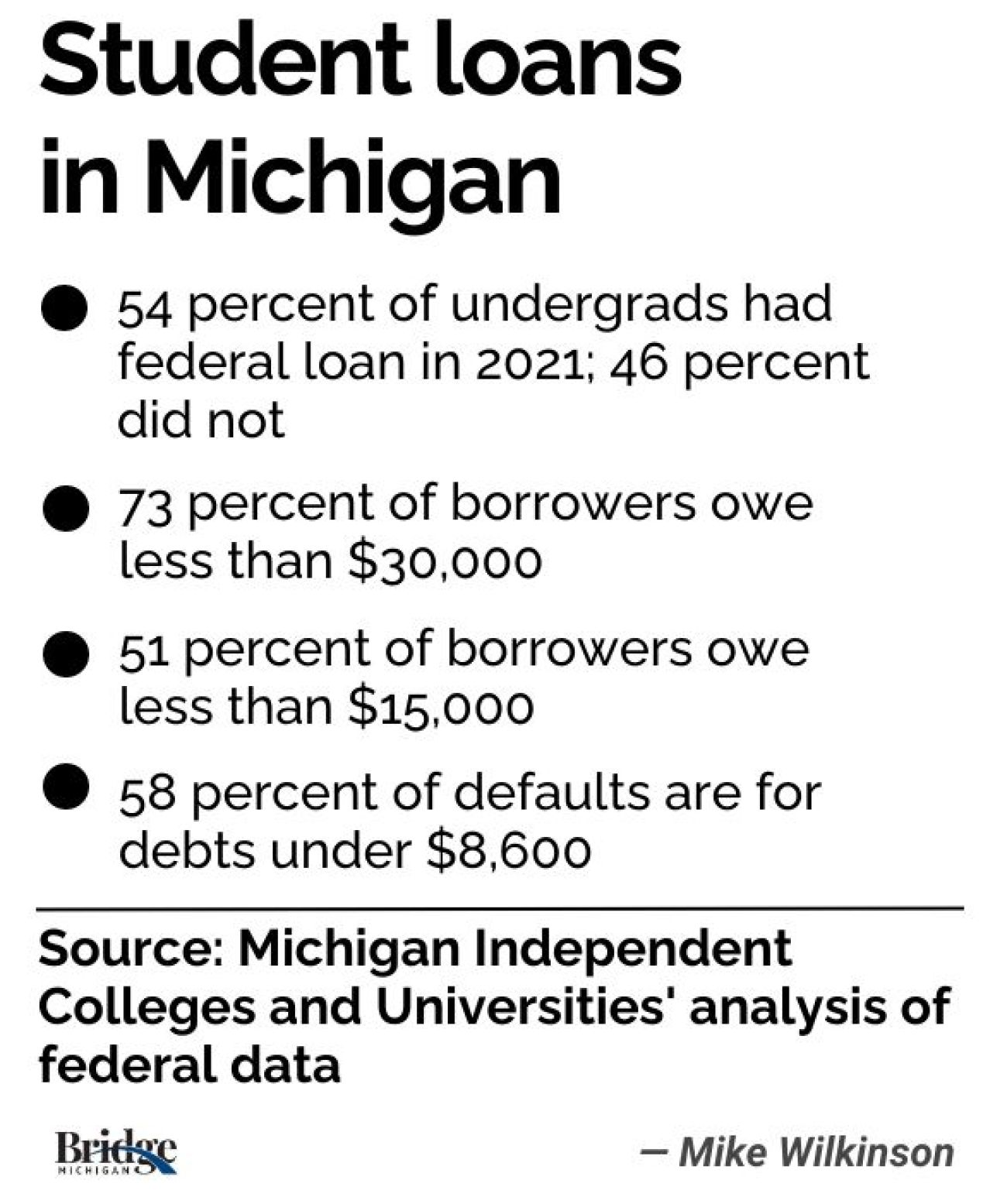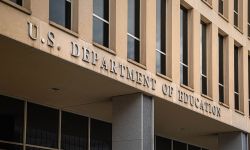Supreme Court ends Biden student loan forgiveness: how it impacts Michigan

- The U.S. Supreme Court struck down President Biden’s student loan forgiveness plan
- The $400 billion plan would forgive up to $20,000 in individual debt. Friday’s ruling impacts over 800,000 Michigan borrowers
- Biden announced a series of moves Friday to help borrowers in other ways
A conservative majority on the U.S. Supreme Court struck down President Joe Biden’s plan to erase billions of dollars of student loan debt.
Friday’s 6-3 ruling impacts some 43 million borrowers nationally, including 20 million people who would have had their loan debt fully erased under the Biden plan. In Michigan, the decision has ramifications for more than 800,000 borrowers.
With student loan repayments set to resume this fall after a three-year pause, the ruling put pressure on the Biden administration to find other avenues for providing debt relief to millions of borrowers.
On Friday afternoon, the president did just that, outlining a new loan relief effort, even as he criticized the court and Republicans for the demise of his original plan. "Today’s decision has closed one path," Biden said. "Now we’re going to pursue another."
The new plan relies on the federal "Higher Education Act" to "compromise, waive or release loans under certain circumstances," after the Supreme Court found fault with an 9/11-era law that the administration used to justify Biden's original loan forgiveness plan.
The administration has also crafted a "ramp-up repayment plan" that gives borrowers extended protection from default as they return to paying back student loans.
Related:
- U.S. Supreme Court affirmative action ban already playing out in Michigan
- How an upcoming Supreme Court ruling on student loan debt impacts Michigan
- Michigan poised to allow beer sales in college stadiums. What research says
Chief Justice John Roberts, writing for the majority Friday, concluded the Biden administration had exceeded its authority by wiping clean $400 billion in student loan debt without specific authorization from Congress. The justices brushed aside the argument that the program was justified by a law passed after the Sept. 11, 2001 attacks that gave the U.S. education secretary power to “waive or modify any statutory or regulatory provision” on student loans during a national emergency.
In rejecting the program, the justices crushed a signature promise made by Biden during his 2020 campaign for president. He unveiled the debt relief program last August, but it was halted by lower courts before it could be implemented.
Federal student loan borrowers have not been required to make payments on their loans since March 2020, when the Trump administration put a pause on loan payments in the early days of the pandemic. That pause was extended by the Biden administration during the COVID-19 health emergency. With that emergency now over, payments are set to resume this fall, but Friday’s ruling dashed borrowers’ hopes of getting some or all of their loans quickly forgiven.
Under the Biden plan struck down by the court, qualified borrowers would receive up to $10,000 in loan cancellations, while borrowers who qualified for Pell Grants while in college — which are given to low-income students — would have received up to $20,000 in loan cancellations.
Roughly 864,000 people in Michigan applied or were automatically deemed eligible for relief before the administration was required to stop accepting applications, the White House said in January. And 566,000 fully-approved applications in Michigan had been sent to loan servicers for discharge at the time.
The high court considered two legal challenges to the Biden program, but dispensed with one of them, ruling Friday that the two plaintiffs in the case lacked sufficient legal standing to pursue the matter.
The second challenge was brought by six Republican-led states — Nebraska, Missouri, Arkansas, Iowa, Kansas and South Carolina.
It was this case that was embraced by Roberts, joined by the five other Republican-appointed justices — Clarence Thomas, Samuel Alito, Neil Gorsuch, Brett Kavanaugh and Amy Coney Barrett.
The three Democrat-appointed justices —- Elena Kagan, Sonia Sotomayor and Ketanji Brown Jackson — dissented.
Justice Kagan wrote in her dissent that the states’ case suffered from some of the same standing issues that doomed the other challenge, arguing the states “have no personal stake” in the loan forgiveness plan and are, instead, “classic ideological plaintiff;” that is, they are suing not because they were impacted by the Biden plan but merely because they did not like it.
“They think the plan a very bad idea, but they are no worse off because the Secretary (of Education) differs,” she wrote.
Kagan accused the majority of judicial overreach by going beyond interpreting the law to striking down a policy the six justices simply did not like.
“In giving those States a forum — in adjudicating their complaint — the Court forgets its proper role,” she wrote. “The Court acts as though it is an arbiter of political and policy disputes, rather than of cases and controversies.”
John Patrick Hunt, law professor at the University of California, Davis said Friday’s decision “continues to make it clear that broad, novel, applications of executive power are very vulnerable under this Supreme Court.”
He said the Biden administration could try to implement a similar plan by defending it under a different legal argument. Or, the administration could try an individualized approach to loan forgiveness instead of a blanket program.
Hunt said it’s important to remember that the administration has made other student loan reforms that were not struck down by Friday’s decision, including proposing changes to repayment plans for federal loans.
But the administration's legal challenges have not quite ended.
The Mackinac Center for Public Policy, a free-market think tank in Midland, is part of a separate lawsuit challenging the federal government’s pause on student loan interest.
Patrick Wright, Mackinac’s vice president for legal affairs, said the loan forgiveness program was not just improperly implemented, it “was bad policy.”
“If there is a problem with student loan and student loan debt, it's more based off of the government policy of subsidizing tuitions and incentivizing the universities to raise tuition past the level of inflation,” Wright said.

He said a better public policy question is “how much tuition can go up and whether or not all of this is because the federal government is handing out so much money for people to incentivize them to go?”
Friday’s decision means borrowers who would have had the entirety of their loans forgiven will need to resume making payments. Biden and Congress negotiated an end date for the student loan pause as part of the recent U.S. debt ceiling deal.
Loans will again accrue interest beginning September 1 and payments will be due starting October.
Jonathan Glater, a law professor at University of California, Berkeley, who had signed onto a friend-of-the-court brief in support of the Department of Education, told Bridge that if and when borrowers are required to resume payments, some people may be “ill-prepared” to do so.
The federal Consumer Financial Protection Bureau noted earlier this month that some student loan borrowers have greater delinquencies on their other debts than they did before the pandemic. And roughly one in five “have risk factors that suggest they could struggle when scheduled payments resume.”
Ryan Fewins-Bliss, the executive director of the Michigan College Access Network, which works to expand students’ access to college, particularly low-income, first-generation college students and students of color, called Friday’s the decision a “massive disappointment to the hundreds of thousands of Michiganders living under the burden of loans taken out in pursuit of higher education.
“This includes tens of thousands of Michigan residents who took out student loans but never completed a degree or certificate, which means they are saddled with debt but unable to access the economic benefits of higher education.”
College affordability in Michigan
While the court’s ruling dashes hopes of swift and broad federal loan forgiveness, at least for now, the state of Michigan has recently passed measures in an effort to reduce the cost burden on students who attend college or university.
Last year, lawmakers and the governor agreed to fund the Michigan Achievement Scholarship, which provides funding for the high school class of 2023 and beyond to attend a Michigan community college, independent nonprofit college or public university.
The state also has the Michigan Reconnect program for people 25 and older who do not already have a bachelor degree to attend their local community college tuition free. Lawmakers this week passed a budget that includes funding to temporarily expand the program to people aged 21 and older. The budget awaits Gov. Gretchen Whitmer’s signature.
There is also a chance that Michigan will get back in the business of lending money to students to pursue a college education.
Last month, amid continuing uncertainty over the Supreme Court case, Whitmer signed an executive directive that ordered the state treasury department to examine the current student loan environment and “assess the costs and benefits” of the state lending money for college education. (The state stopped issuing student loans in 2008.)
Michigan Education Watch
Michigan Education Watch is made possible by generous financial support from:
Subscribe to Michigan Education Watch
See what new members are saying about why they donated to Bridge Michigan:
- “In order for this information to be accurate and unbiased it must be underwritten by its readers, not by special interests.” - Larry S.
- “Not many other media sources report on the topics Bridge does.” - Susan B.
- “Your journalism is outstanding and rare these days.” - Mark S.
If you want to ensure the future of nonpartisan, nonprofit Michigan journalism, please become a member today. You, too, will be asked why you donated and maybe we'll feature your quote next time!






